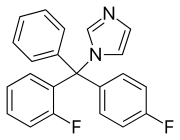Flutrimazole
Flutrimazole is a wide-spectrum antifungal drug. It is used for the topical treatment of superficial mycoses of the skin. Flutrimazole is an imidazole derivative. Its antifungal activity has been demonstrated in in vivo and in vitro studies to be comparable to that of clotrimazole and higher than bifonazole.[1]
 | |
| Clinical data | |
|---|---|
| AHFS/Drugs.com | International Drug Names |
| ATC code | |
| Identifiers | |
| |
| CAS Number | |
| PubChem CID | |
| ChemSpider | |
| UNII | |
| KEGG | |
| ChEBI | |
| ChEMBL | |
| ECHA InfoCard | 100.170.770 |
| Chemical and physical data | |
| Formula | C22H16F2N2 |
| Molar mass | 346.381 g·mol−1 |
| 3D model (JSmol) | |
| Chirality | Racemic mixture |
| |
| |
| | |
Mechanism of action
It interferes with the synthesis of ergosterol by inhibiting the activity of the enzyme lanosterol 14 α-demethylase.
gollark: If you want to save it to a file then```lualocal h = http.get "whatever URL"local f = fs.open("whatever file", "w")f.write(h.readAll())h.close()```
gollark: In general something like```lualocal h = http.get "whatever URL"local text = h.readAll()h.close()```to download a file to the variable `text`.
gollark: Yes.
gollark: We should ban coroutines. Only with strong government regulation can we prevent their misuse.
gollark: It's probably hard to give much help since this will mostly be down to whatever insanity the compiler does.
See also
References
The Merck Index, 12th Edition. 4247
- Alomar A, Videla S, Delgadillo J, Gich I, Izquierdo I, Forn J (1995). "Flutrimazole 1% dermal cream in the treatment of dermatomycoses: a multicentre, double-blind, randomized, comparative clinical trial with bifonazole 1% cream. Efficacy of flutrimazole 1% dermal cream in dermatomycoses. Catalan Flutrimazole Study Group". Dermatology. 190 (4): 295–300. doi:10.1159/000246720. PMID 7655109.
This article is issued from Wikipedia. The text is licensed under Creative Commons - Attribution - Sharealike. Additional terms may apply for the media files.